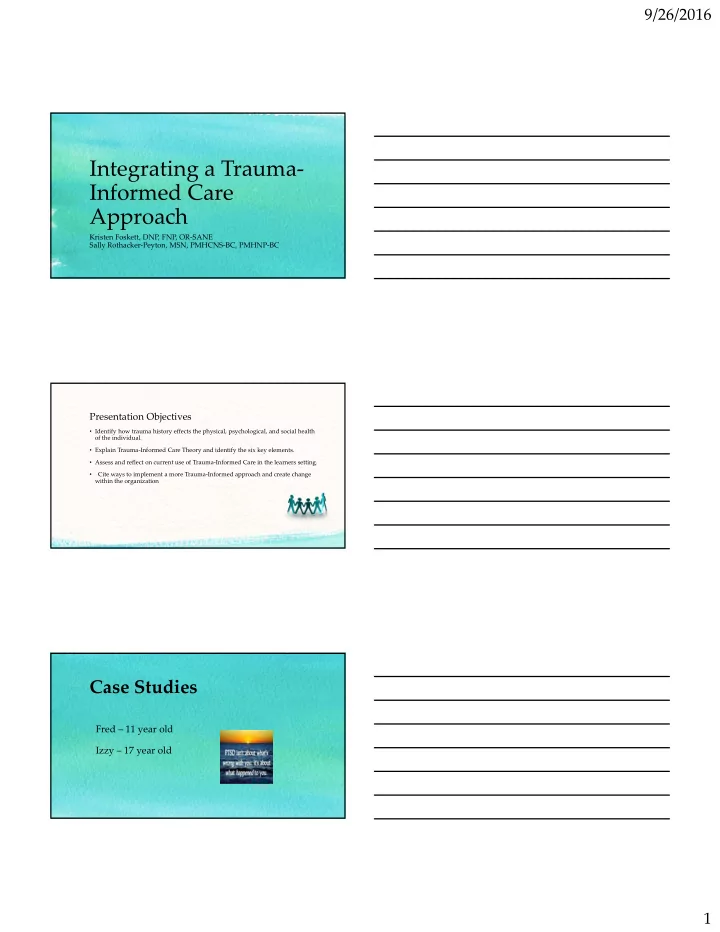

9/26/2016 Integrating a Trauma ‐ Informed Care Approach Kristen Foskett, DNP, FNP, OR ‐ SANE Sally Rothacker ‐ Peyton, MSN, PMHCNS ‐ BC, PMHNP ‐ BC Presentation Objectives • Identify how trauma history effects the physical, psychological, and social health of the individual. • Explain Trauma ‐ Informed Care Theory and identify the six key elements. • Assess and reflect on current use of Trauma ‐ Informed Care in the learners setting. Cite ways to implement a more Trauma ‐ Informed approach and create change • within the organization Case Studies Fred – 11 year old Izzy – 17 year old 1
9/26/2016 Trauma Informed Care Four R’s: Key Assumptions Realization Recognize Responds Resist re ‐ traumatization ( SAMHSA) 2
9/26/2016 Six Key Principles of a Trauma ‐ Informed Approach Safety Trustworthiness & Transparency Peer Support Collaboration & Mutuality Empowerment, Voice and Choice Cultural, Historical, & Gender Issues ( Harris & Fallot, SAMHSA) Case Studies ‐ Well Woman Exam ‐ Substance Use History Well Woman Exam: Marisol 45 yo woman Problem list/Meds: G2P2 • Fibromyalgia: Norco 5/325 qday, gabapentin 300mg TID Last Pap >5 years ago • Depression/Anxiety: Celexa 20mg Not married, kids are 19 and 22, live outside of home • Tobacco Abuse: 0.5 ppd Works as caregiver but has reported • Prediabetes: Lifestyle changes only multiple work related injuries and is on leave from work. • Hyperlipidemia: Atorvastatin 20mg 3
9/26/2016 Substance Use History: Stan • 28 yo male • Hx of closed head injury 3 years ago • Hx of meth use starting age 24, in • Untreated ADHD in childhood remission for 3 months • Bipolar disorder, just started back on • Unemployed, lives with current Seroquel girlfriend • Hep C Virus Positive • Has 2 children, not in touch with • Tobacco Abuse, 1ppd since at 13 either • Extensive dental carries How Do We Improve Our Care (and Self Care) ? SAMHSA’s Suggestions for a TIC environment Governance & Leadership Policy Environment Engagement Collaboration of Service Sites Training & Development Financing Evaluation 4
9/26/2016 Creating A More Trauma ‐ Informed Approach Individual Provider Level: Systems Level: • Communication • Policy • Avoiding Re ‐ traumatization • Screening Tools • Team approach • Interdisciplinary Communication • Providing Choice • Environment • Self ‐ Care/Burnout What’s Happening in Oregon? • Trauma Informed Oregon • Clackamas Behavioral Health Centers: Oregon City • The Sanctuary Model: The Dalles, Oregon • Volunteers of America Women’s – Oct. 20 &21 st Trauma and Resiliency Residential Treatment Summit • The Children’s Clinic, Portland ‐ Developing a universal screening tool • CareOregon: Resilience Program CCO’s: Columbia Pacific and • SAMHSA-HRSA Position Statement CareOregon Resilience Program • TIC High School in Astoria, OR • Trauma Healing Project: Eugene References 5
Recommend
More recommend